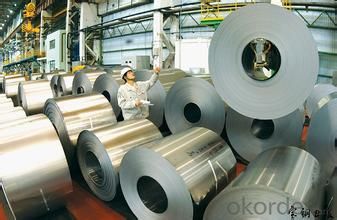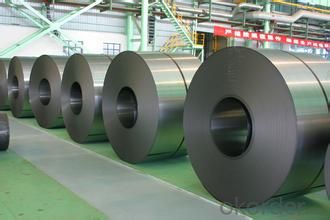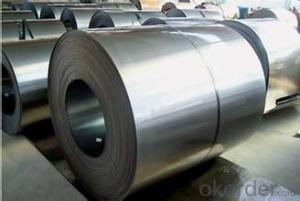Cold Rolled Steel of High Quality with Different Thickness
- Loading Port:
- Tianjin
- Payment Terms:
- TT OR LC
- Min Order Qty:
- 100 m.t.
- Supply Capability:
- 50000 m.t./month
OKorder Service Pledge
OKorder Financial Service
You Might Also Like
1.Structure of Cold Rolled Steel Description:
The raw material of cold rolled steel coil/sheet is high quality hot rolled product, and after pickling continuous rolling, degreasing, annealing,skin pass,slitting and cut to length line etc. Along with it many kinds of new technology and new process of global cold rolling production have been applied. Therefore the quality of the goods could be guaranteed. The product is widely used in outdoor and interior decoration, furnishing manufacturing, home appliance, automobile etc.
2.Main Features of the Cold Rolled Steel:
• Excellent process capability
• Smooth and flat surface
• Workability, durability
• Excellent heat resistance performance
• High strength
• Good formability
• Good visual effect
3.Cold Rolled Steel Images


4.Cold Rolled Steel Specification
Standard:AISI,ASTM,DIN,GB,JIS,JIS G3302 ASTM 653M EN10142
Grade: Q195~Q345
Thickness: 0.16mm~1.5mm,0.16-1.5mm
Width: 1250,600-1250mm
Coil weight:3-12 MT
Coil ID:508/610mm
Chemical composition:
C | Si | Mn | Cr | Ni | P | S |
0.150 | 0.476 | 11.231 | 12.50 | 0.900 | 0.039 | 0.010
|
5.FAQ of Cold Rolled Steel
We have organized several common questions for our clients,may help you sincerely:
1.How about your company?
A world class manufacturer & supplier of castings forging in carbon steel and alloy steel,is one of the large-scale professional investment casting production bases in China,consisting of both casting foundry forging and machining factory. Annually more than 8000 tons Precision casting and forging parts are exported to markets in Europe,America and Japan. OEM casting and forging service available according to customer’s requirements.
2.How to guarantee the quality of the products?
We have established the international advanced quality management system,every link from raw material to final product we have strict quality test;We resolutely put an end to unqualified products flowing into the market. At the same time, we will provide necessary follow-up service assurance.
3. How long can we receive the product after purchase?
Usually within thirty working days after receiving buyer’s advance payment or LC. We will arrange the factory manufacturing as soon as possible. The cargo readiness usually takes 15-25 days, but the shipment will depend on the vessel situation.
4. Which payment term we can do?
L/C at sight or T/T.
5. Where is our factory?
Near by Tianjin and Shanghai.
6. What is the mininum quantity of every order?
50 tons.
- Q:How much does a steel coil weigh?
- The weight of a steel coil can vary depending on its dimensions and thickness. However, on average, a steel coil can weigh anywhere between 2 to 20 tons.
- Q:can anyone help me to find any webpage about lists/types of stainless steel?
- Types of stainless steel There are over 150 grades of stainless steel, of which fifteen are most common. The AISI (American Iron and Steel Institute) defines the following grades among others: - 200 Series—austenitic iron-chromium-nickel-manganese alloys - 300 Series—austenitic iron-chromium-nickel alloys Type 301—highly ductile, for formed products. Also hardens rapidly during mechanical working. Type 303—free machining version of 304 via addition of sulfur Type 304—the most common; the classic 18/8 stainless steel Type 316—Alloy addition of molybdenum to prevent specific forms of corrosion - 400 Series—ferritic and martensitic alloys.
- Q:How are steel coils used in the manufacturing of agricultural structures?
- Steel coils are a vital component in the manufacturing of agricultural structures due to their durability, strength, and versatility. These coils, which are typically made from high-quality steel, are used in various ways throughout the process of constructing agricultural structures such as barns, silos, and storage buildings. One of the primary uses of steel coils in agricultural structures is in the fabrication of the building's framework. The coils are unwound and cut into specific lengths, which are then bent, shaped, and welded together to form the structural framework of the building. The strength and rigidity of steel coils make them an ideal choice for withstanding the heavy loads and harsh environmental conditions commonly found in agricultural settings. Additionally, steel coils are also used to manufacture various components and accessories for agricultural structures. These coils can be transformed into panels, roofing sheets, doors, and windows, which are essential elements in the construction of agricultural buildings. The ability to customize the shape, size, and thickness of the steel coils allows for flexibility in design and ensures that the finished structure meets the specific requirements of the agricultural application. Furthermore, steel coils play a crucial role in providing protection and safety within agricultural structures. They are used to fabricate fencing and gates, providing a secure boundary around the premises and preventing unauthorized access. Steel coils can also be used to reinforce the walls and floors of the building, enhancing its overall stability and durability. Moreover, steel coils offer excellent resistance to corrosion, which is particularly important in agricultural structures due to the exposure to moisture, chemicals, and other corrosive elements. Their durability ensures that the structure remains intact and functional for an extended period, reducing maintenance and replacement costs. In conclusion, steel coils are an essential component in the manufacturing of agricultural structures. Their strength, durability, versatility, and resistance to corrosion make them an ideal choice for constructing the framework, components, and accessories of these buildings. By utilizing steel coils in the manufacturing process, agricultural structures can be built to withstand heavy loads, harsh environmental conditions, and provide long-lasting protection for agricultural operations.
- Q:How are steel coils measured?
- Steel coils are measured by their weight and dimensions. The weight of the coil is measured using weighing scales, while the dimensions are typically measured using calipers or tape measures. The length, width, and thickness of the coil are important measurements that determine its size and suitability for specific applications.
- Q:Can steel coils be used in the production of automotive parts?
- Yes, steel coils can be used in the production of automotive parts. Steel coils are commonly used in the manufacturing of various automotive components such as body panels, chassis parts, springs, and engine components due to their strength, durability, and formability. The coils are processed and shaped into the desired automotive parts using various techniques such as cutting, stamping, welding, and forming.
- Q:i want to buy an exhaust but whats the difference between satinless steel and titanium exhaust?
- Stainless steel is more corrosion resistant than steel and titanium is more corrosion resitant and lighter. However, titanium is more prone to picking up (scratches caused by normal tools creating scratches and leading to stress fractures). The Lockheed Blackbird had to have tools treated lithium grease (i could be wrong) to prevent this. I'd stick with stainless steel as i think any titanium exhaust you can buy will be a titanium composite due to its cost
- Q:Could someone please explain what happens when steel is heat treated and why these happenings cause the steel to become harder? Please dig down into the micro details of the crystallites but in somewhat laymen's terms. Also describe the processes which achieve these results; if you have the time. Thanks for your time and effort.
- Alright, usually whu heat you heat treat mild steel, this is because you would like it stronger than you got it. To do this you must alter the grain structure of the part or in other words, the CRYSTALLITES. Ultimately you'll end up altering the nature of the grains structure changing the tensile strength it can handle, yield strength, and even change the elongation percentage that it can tolerate under load. Heat treatment controls the rate of diffusion, and the rate of cooling within the microstructure to create these elements. Usually what they use to do this is add an element to it to make it stronger such as carbon to increase its rockwell hardness, which by the way the lower you go the harder the part can become. Heat treatment can be used in more ways than this. It can also be used to weaken the parts grain structure. This will lower the parts mechanical properties making it softer and more ductile or easier to manipulate if you have to bend it into a particular shape. Typically if you allow the part to cool after heat treatment it does go through annealing. The part will be heat treated into different stages. The first being the austenitic crystal phase which depending on how hard and strong you want it, will be at its peak. When it is cooled, it will go through a will transform to martensite which is a hard yet brittle crystalline structure. Martenised part will usually be tempered to a certain degree to improve the mechanical properties to what is needed. There is more to this and you can use the link below to read more about it.
- Q:In the game RuneScape, the concept of the fictitious metal, Rune has intrigued me. On an equal area AND weight basis (with a possible 10 lb exception) what metal is 256% stronger than steel?
- aluminum
- Q:what is the stucture of high carbon steel
- I dont know percentages just that it is basic steel with added carbon it is used for tooling and other reasons that need a steel that can be hardened ~~
- Q:How are steel coils used in the production of food processing machinery?
- Steel coils are used in the production of food processing machinery as they are commonly used to create the structural frames and components of the machinery. Additionally, steel coils are often used to manufacture cutting blades, conveyor belts, and various other parts that require strength and durability in the food processing industry.
1. Manufacturer Overview |
|
|---|---|
| Location | |
| Year Established | |
| Annual Output Value | |
| Main Markets | |
| Company Certifications | |
2. Manufacturer Certificates |
|
|---|---|
| a) Certification Name | |
| Range | |
| Reference | |
| Validity Period | |
3. Manufacturer Capability |
|
|---|---|
| a)Trade Capacity | |
| Nearest Port | |
| Export Percentage | |
| No.of Employees in Trade Department | |
| Language Spoken: | |
| b)Factory Information | |
| Factory Size: | |
| No. of Production Lines | |
| Contract Manufacturing | |
| Product Price Range | |
Send your message to us
Cold Rolled Steel of High Quality with Different Thickness
- Loading Port:
- Tianjin
- Payment Terms:
- TT OR LC
- Min Order Qty:
- 100 m.t.
- Supply Capability:
- 50000 m.t./month
OKorder Service Pledge
OKorder Financial Service
Similar products
New products
Hot products
Related keywords





























